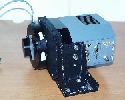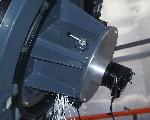
Russian-Turkish 1.5-m Telescope

(C) Copyright
HEAD
IKI
Telescope's focal detectors
Until 2002 observations were mostly performed with ST-8E CCD
in the 1:7.7 Cassegrain focus. It is equipped with a set of standard UBVRI filters
and system of adaptive optics. Since the summer of 2002 AP-47p
became the main detector, and ST-8E is used as a guiding CCD starting from
September, 2002. In April, 2003 telescope was equipped with a larger-size CCD
Andor DW436.
Andor CCD

Testing of Andor DW436 CCD as
a focal detector of RTT150 telescope has started in Spring 2003. CCD has replaced
AP-47p inside the assembly with ST-8E serving as autoguide
(see photo).
During the May 21-29, 2003 observing run in the autoguiding mode Andor DW436 CCD
being cooled downto -60oÑ has shown a very low noise level and
extremely high image quality (see image).
| Chip | Andor DW436 |
| Size of active area | 2048 x 2048 pixels,
27.6 x 27.6 mm |
| Total number of pixels | 4,194,304 |
| Pixel size | 13.5 x 13.5 mkm |
| Dark current | 1.7 e-/pix/hr |
| Readout noise | 3.5e- rms @31kHz |
AP47p CCD
Since summer of 2002 the main focal detector of the RTT150 telescope was
AP47p CCD in 1:7.7 Cassegrain focus.
It is electrically cooled downto -45o -50o relative to
the environment temperature.
| Chip | Marconi CCD47-10 |
| Size of active area | 1024 x 1024 pixels,
13.3 x 13.3 mm |
| Total number of pixels | 1,048,576 |
| Pixel size | 13 x 13 mkm |
| Readout noise | <10e- RMS |
| Frame readout time | 20 s |
| Binning modes | from 1 x 1 to 8 x 63 |
| Exposures | from 0.03 to 10400 sec, resolution 10 ms |
| Focus outlet | 2.9 cm |
During September 3-13, 2002 works on installation of new autoguiding system (photo 1) were carried out on RTT150 telescope. IKI and KSU specialists have taken part in this work. Installation of CCDs to the autoguide frame, frame assembly and its installation on the base bearing of a telescope was done. Adjustment of mutual position of the CCDs was made and preliminary adjustment of hardware-software parameters of autoguiding system was executed. The first test image of an area of the star sky with working system was received (image 1).
The autoguiding system includes two electrically cooled CCD matrices. In Autumn
2002 the main matrix was AP47p by Apogee Instruments with CFW-8 system of filters
(photo 2), the guiding one having been
the ST-8E matrix from Santa Barbara Imaging Group (photo
3). Both matrices are assembled in one casing (photo
4, photo 5). AP47p is placed
at the optical axis of a telescope and ST-8E is located at a
right angle to the optical axis. The image gets to this matrix
with the help of an additional flat diagonal mirror. Both matrices
are connected to a computer with MaxIm DL/CCD software by Diffraction Limited
company (http://www.cyanogen.com/products/maximdlccd)
that controls the work of CCDs. The same program is used for issuing
the control signals to fine correction drives of a telescope.
ST-8E CCD
 ST-8E CCD by SBIG has a full
resolution of 1530x1020 pixels and active area size of 13.8x9.2mm2.
Corresponding field of view is 4.1' x 2.7'.
ST-8E CCD by SBIG has a full
resolution of 1530x1020 pixels and active area size of 13.8x9.2mm2.
Corresponding field of view is 4.1' x 2.7'.
CCD is front-illuminated and has quantum efficiency of 30-60%. It is electrically cooled downto -35o from environment temperature. For this reason the CCD has quite a high dark current. Its value strongly depends on the CCD temperature and hense on the surrounding temperature. That's why correct calibration of the dark current is critical.
CCD is equipped with a standard set of Johnson-Cousins
UBVRI filters as well as
SBIG AO-7 adaptive optics
system.
| Chip | Kodak KAF-1602E
+ TI TC-211 |
| Size of active area | 1530 x 1020 pixels,
13.8 x 9.2 mm |
| Total number of pixels | 1,500,000 |
| Pixel size | 9 x 9 mkm |
| Shutter | Electromechanical |
| Exposures | from 0.11 to 3600 sec, resolution 10 ms |
| A/D conversion | 16 bit |
| A/D gain | 2.3e-/ADU |
| Readout noise | 15e- RMS |
| Binning modes | 1 x 1, 2 x 2, 3 x 3 |
| Pixels digitizing rate | 30 kHz |
| Frame readout time | 60 s |
| Focus outlet | 2.3 cm |